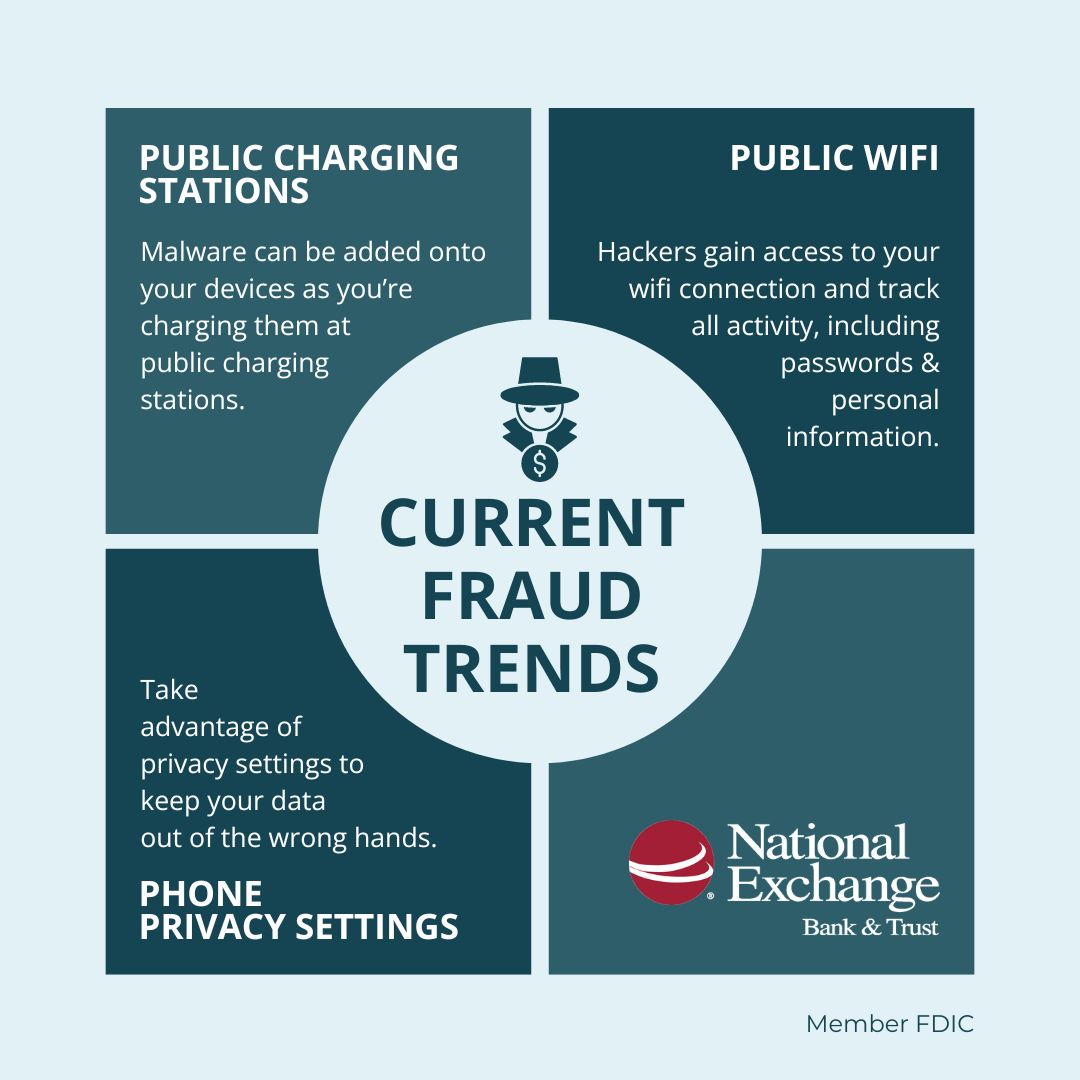Exploring Current Fraud Trends
| Posted in News, Security & Fraud
In our fast-paced world, we can quickly gain access to information on-the-go using our cell phones. Although convenient, hackers know that this means we are not always the most careful with our information in these circumstances. A few common fraud trends we’re seeing more frequently are hacking through public charging stations, public Wi-Fi, and cell phones without updated privacy settings.
Below we’ll dive into each one of these scenarios and why they are a threat as well as our recommendations to keep your information secure.
Public Charging Stations
While public charging stations at places like airports and hotels are very convenient, we recommend avoiding them at all costs. Hackers have found a way to add malware and other device monitoring software onto your devices as you’re charging them at public charging stations. This fraud trend is commonly referred to as “juice jacking” and could cost you a cyber-attack.
Staying Safe
NEBAT recommends keeping a portable charging bank or charger with USB cord with you and using an electrical outlet instead of a USB outlet to avoid any potential hacks.
If you’re out of luck when it comes to a spare charger, some cell phones also offer “USB restricted mode” that prevents juice jacking. On some phones, this is found under password settings, but you may have to research the exact instructions for your device.
Public Wifi
Connecting to public Wi-Fi has become second nature in our on-the-go world. It is important to understand that these networks are less secure than you think. Hackers are everywhere and sometimes are some of the least-suspecting people. Within minutes they can have your information in the palm of their hands. Here are just a few common ways they can do so:
- Hackers will set up seemingly public Wi-Fi (i.e. “Hotel Free Wi-Fi”). Once you connect, they can quickly get ahold of your data.
- They can also break into public networks and watch as data travels between your device and the Wi-Fi router meaning anytime you type in a password, they can see it.
- Some router default settings allow hackers to log in as an administrator and hack into compromised devices.
Think about the last time you were connected to public Wi-Fi. You were likely connected to your email, social media, Amazon or other online shopping accounts, or even your bank account. These platforms all house incredibly private and critical information that can be taken in the click of a few buttons.
Staying Safe
So what can you do about it? NEBAT recommends avoiding this connection and using your cell phone data whenever possible to keep your information private. We understand this isn’t always possible though, so if you need to connect to a public network, here’s what we recommend doing before connecting to public Wi-Fi:
- Use a VPN if possible. VPN stands for “Virtual Private Network.” It is a service that protects your internet connection and privacy online.
- Clear all history - browsing history, cache, and close all running apps.
- Log out of all accounts you do not intend to use. Then, log into any accounts you’ll need before connecting to Wi-Fi.
- Ensure your antivirus is up to date and running.
- Turn off:
- Bluetooth to prevent others from being forced to connect.
- “Auto-connect” so you can select the Wi-Fi you intend to use. We suggest using Wi-Fi networks you can directly tie to the location you’re at.
- ALWAYS use secure passwords and enable multi-factor authentication.
When you’ve finished using the Wi-Fi, you can then do a quick scan on your device for any malware. We also recommend restarting your device to break the connection from the network or any potential hackers.
Phone Privacy Settings
The last fraud trend we’re seeing is cell phone compromise. Our entire lives are housed in the palm of our hands, therefore it’s no surprise that hackers enjoy getting into our cell phones. There are a few ways you can keep your data private if your phone gets into the wrong hands:
- Have some form of lock on your phone: 6-digit code, thumbprint, facial recognition, etc.
- Make sure your software is always up to date. Outdated software is low-hanging fruit for hackers.
- Research privacy/data-protection settings for your unique device. A few that are out there include:
- Auto-erase data: If someone tries too many times to unlock your device, it will automatically erase any data stored in your phone.
- Important note: If you use this feature, be sure you have your data backed up. While you don’t want hackers stealing your data, you still want to keep it for yourself. This is extra important if your phone can get into the hands of children too.
- Auto-erase data: If someone tries too many times to unlock your device, it will automatically erase any data stored in your phone.
- Stop Snoops: While all smartphones have a lock feature on the phone, some can lock particular apps or screens on your device as well. Some even will send you an alert if someone tries to open an app or screen with an incorrect login. We recommend researching how to set this up for your unique device.

Fraud Trends Always Change
The three fraud trends mentioned above are just a few that are gaining in popularity, but unfortunately, this list will be never-ending. If you’re ever questioning if your data could be under attack, NEBAT is happy to help provide resources and guidance! Below you’ll find a few additional articles on other recent fraud events:
